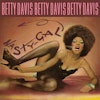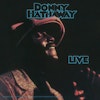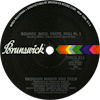Last night, I stumbled upon the impressionistic snip of a documentary on balls-to-the-wall, rock-out, R&B singer-songwriter Betty Davis. The 2017 film Betty: They Say I’m Different looked into the too-brief career, and too-long-in-silence retirement of Davis, whose violent marriage to jazz trumpeter Miles Davis, and disappointing interactions with male-driven record labels in the 1970s, left her spent. She wasn’t the first (or last) woman to be harassed by Miles, or the first (or last) female act to be underserved by the music industry. And if the documentary world is any form of justice, we’ll see those tales told now in living color so that they never occur again.
Betty Davis, who passed away at the top of February 2022 at the age of seventy-seven, was hailed for a past that touched upon her auteur spirit (after her eponymous debut, she produced almost everything she recorded), her flamboyance (Betty’s adventurously funky fashion manner inspired Miles to ditch jazz’s suit-and-tie decorum), and a brazen sexuality and rock-funk vibe that made her unplayable on the staid radio programming formats of the day.
That hard-driving sex and smoldering raw funk-punk tone certainly held sway over her first two albums, 1973’s Betty Davis (produced by Sly and the Family Stone drummer Greg Errico, with contributions from the Pointer Sisters, Sylvester, guitarist Neal Schon, organist Merl Saunders, and Sly bassist Larry Graham) and 1974’s They Say I’m Different. The one thing, though, that is most noticeable about those two records, beyond the fact that Davis was in possession of the greasiest growl-and-scream this side of Janis Joplin, is that her Just Sunshine label albums actually don’t sound very good. Listening to them in the present day, their production is thin, the material often sounds dated, and the sexuality that Davis portrays can be heard in more hard-core settings by elders such as blues-jazz goddess Ma Rainey or even a ’70s contemporary such as Millie Jackson.
Davis’s true and most deliberate masterwork, then, is her third—and last—official album, and her first and only excursion into major-label release: 1975’s Nasty Gal, which was pushed by Robert Palmer (supposedly her boyfriend at the time), Britain’s blue-eyed-soul avatar, to friend and label head Chris Blackwell, for the latter’s Island Records.
From its scantily attired photo on the album sleeve to its mellow-harshing R&B, Nasty Gal is pure Betty, at her boldest. Happily, too, as Nasty Gal is the auteur at her most diverse, showing off her full-flower’s potential to a world that, sadly, didn’t care or wasn’t ready, as she never sold much, even as Island Records, at the time, pumped tons of cash into press and radio promotion. If you missed out on Ms. Betty by not jumping on Davis’s hard-chugging soul train, this one’s on you.
Eschewing the thin production of its predecessor, They Say I’m Different, Davis ramped up the rhythm stick of Funk House—her longtime live band—and propelled bassist Larry Johnson and drummer Semmie “Nicky” Neal Jr. into more of a foreground setting. Or at least a side-by-side relationship with Davis on a rough song such as “Feelins,” where her rhythm section, along with guitarist Carlos Morales, mimic the singer and double each other’s melodies. This couldn’t be the first time musicians “twinned” each other, but it certainly sounds like a revelation, something Thin Lizzy and noted Davis fan, Rick James, would eventually make their signature.
This thick and raunchy early punk-funk work goes one step further in its approximation of Sly Stone’s spacey rainbow psychedelia on the elongated album closer, “The Lone Ranger” (all six-plus minutes!), and the record’s churning title track. On the latter cut, the fiery, background churn parts just enough to allow Davis to open up and howl-growl lines such as “You said I love you every way but your way / And my way was too dirty for ya now” in a fashion so frightening, you’re not sure if she’s ready to fuck you or punch you.
And while self-penned gutbucket funk and salacious soul songs such as “Gettin Kicked Off, Havin Fun,” “Talkin Trash,” and “Shut Off the Light” top the torrid album, the ensemble-written “The Lone Ranger” could be mistaken for jam rocker with an incendiary sting, and “F.U.N.K.” has a dense tribal element that is thrilling in the way Davis—the producer, arranger, and the vocalist—jazzily interacts with her rhythm section and conga player Errol “Crusher” Bennett. Written with bassist Larry Williams, a player also renowned for his country chops, “Dedicated to the Press” finds Davis humorously (I think? I guess?) toying with rock scribes who simply didn’t know how to take a woman, and a Black woman, who did the bump-and-grind with such honest force:
“Extra, extra, have you read about me? They say I stick out my tongue quite lecherously /
Well, I really don’t know what they’re talkin’ about / I just can’t seem to keep my tongue in my mouth”
What’s weird, and inaccurate, about Davis’s complaint is that the press loved her records, Nasty Gal in particular. More than likely, Davis is ranting and railing against radio programmers for whom her schtick was too rock for Black radio (still is) and too funked up for white radio (still is).
Unlike Davis’s other albums, which both feature stressed-out rock-and-funk excursions, Nasty Gal holds a rare, gorgeous gem: the slow-burning, churning ballad, “You and I.”
Unfortunately (for me) cowritten by Miles Davis, and amazingly fortunate enough to feature the multi-tonic arrangement of Miles’s conductor and orchestrator Gil Evans, “You and I” is unlike anything else on this record, or unlike anything Betty Davis had publicly attempted to that point. (There is an album of Columbia label rarities from before and during her time with Miles on Light in the Attic to look out for.)
Just as bold and wild as her more risqué lyrics and music, “You and I” is tender and touching, romantic and never needy, with Davis’s usual provocation and force high in the mix. Yes, she’ll open her heart, and tell her partner how much she loves and needs. But she isn’t about to let down her guard or her gall:
“But it’s so hard for me to be me / I wish I could give to you /
I’d be free, I’d be free, I’d be free / Ahh, then I could be me”
As far as the R&B&rock, the punk-funk, or genre-less album history goes, Nasty Gal was a future-forward, marvelous mess-in-a-dress in 1975, and right on time when it comes to the world of Janelle Monáe, Willow, Erykah Badu, and H.E.R.


